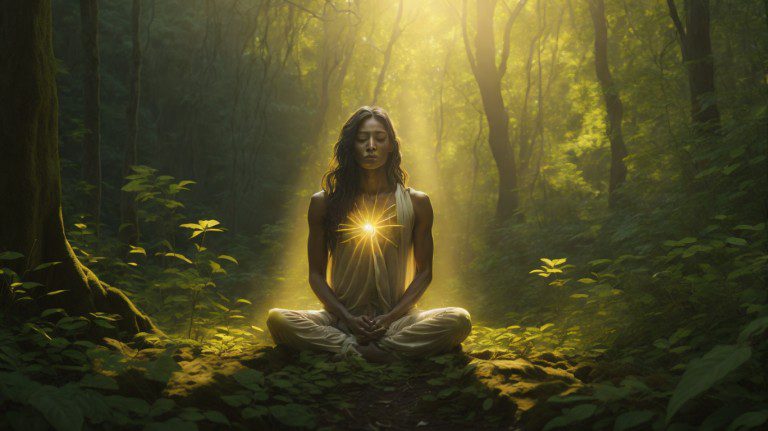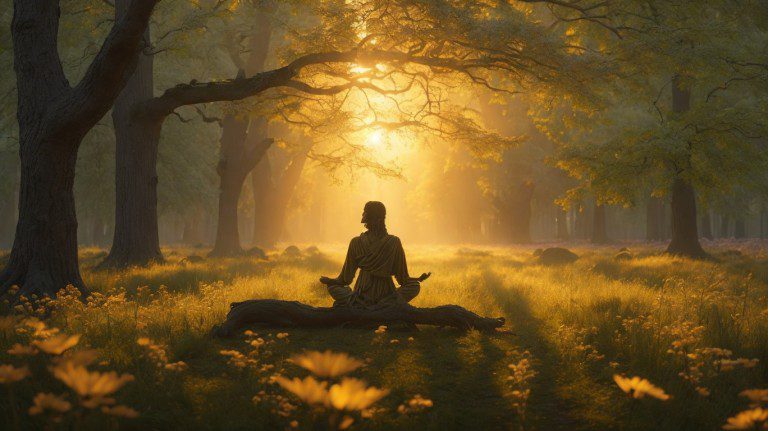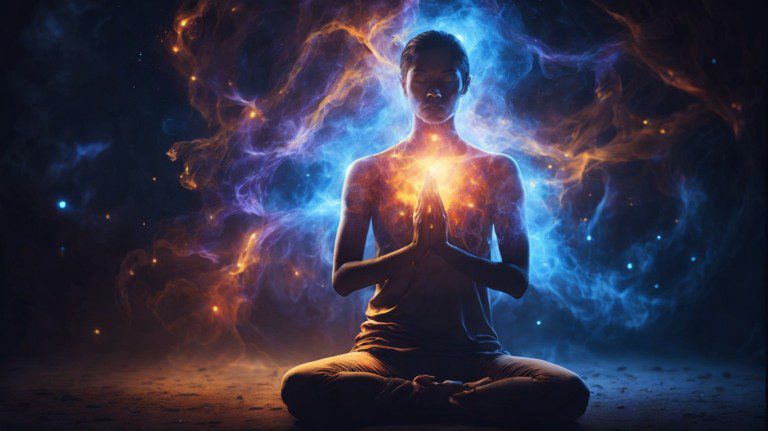Can Spirituality Be Defined Without Religion?
Are you searching for a deeper understanding of spirituality, but hesitant to embrace religious dogma? Look no further.
In this thought-provoking article, we delve into the question…
Can spirituality exist independent of religion?
Through an academic, analytical, and philosophical lens, we explore the historical roots, contemporary interpretations, and cultural impact of spirituality in a secular world.
Join us on this journey of self-discovery as we examine the intricate relationship between spirituality and religion, all while embracing the freedom to seek your own truth.
Key Takeaways
- Spirituality is a personal and subjective experience that can exist without adherence to any specific religious doctrine.
- Contemporary interpretations of spirituality focus on personal growth and self-discovery, departing from traditional religious frameworks.
- Secular spirituality promotes the acceptance of diverse beliefs and practices, fostering an inclusive society.
- Engaging in spiritual practices can promote emotional well-being, reduce stress, and enhance overall mental resilience, regardless of religious affiliation.
Historical Roots of Spirituality
In exploring the historical roots of spirituality, you’ll find a rich tapestry of beliefs and practices that transcend traditional religious boundaries.
Spiritual practices have existed since ancient times, with various cultures and civilizations embracing their own unique perspectives on the sacred and the divine.
From the mystical traditions of ancient Egypt to the philosophical teachings of ancient Greece, historical perspectives on spirituality reveal a deep human longing for connection with something greater than ourselves.
These practices encompass a wide range of rituals, meditation techniques, and contemplative exercises aimed at exploring the depths of consciousness and expanding one’s awareness of the spiritual realm.
They provide individuals with a sense of purpose, meaning, and inner peace, offering a path towards personal growth and self-discovery.
Can Spirituality Be Defined Without Religion? Contemporary Interpretations of Spirituality
Contemporary interpretations of spirituality reflect a departure from traditional religious frameworks, offering a broader and more inclusive perspective.
These interpretations acknowledge the evolving nature of spirituality and the diverse ways in which individuals seek meaning and connection in their lives.
Non-religious spirituality perspectives have emerged, emphasizing personal growth, mindfulness, and the exploration of inner experiences as avenues for spiritual fulfillment.
Non-Religious Spirituality Perspectives
You might find it interesting to explore non-religious perspectives on spirituality.
In contemporary times, there’s been a growing interest in non-theistic spirituality, which focuses on personal growth and self-discovery without the involvement of any religious beliefs or doctrines.
Non-religious spirituality emphasizes the connection to oneself, others, and the natural world, fostering a sense of meaning and purpose in life.
While religious spirituality often employs rituals and prayers, non-religious spirituality embraces a variety of spiritual practices such as meditation, mindfulness, yoga, and nature walks.
These practices allow individuals to cultivate a deeper understanding of themselves, to find solace in the present moment, and to develop a harmonious relationship with the world around them.
Evolving Definitions of Spirituality
As society evolves, your understanding and perception of what constitutes a spiritual experience continue to expand and transform.
From an evolutionary perspective, spirituality can be viewed as a natural inclination of human beings to seek meaning and connection beyond the material realm.
It’s a deeply personal and subjective experience that transcends religious boundaries.
Spiritual experiences can be triggered by various factors such as meditation, mindfulness, nature, art, or even scientific inquiry.
In fact, scientific exploration itself can be seen as a form of spiritual inquiry, as it seeks to uncover the mysteries of the universe and deepen our understanding of our place in it.
In this evolving definition of spirituality, the emphasis shifts from religious dogma to personal exploration and freedom, allowing individuals to find their own unique path towards spiritual fulfillment.
Philosophical Perspectives on Spirituality
Can spirituality be defined without religion?
When exploring philosophical perspectives on spirituality, one must navigate the complex relationship between spiritual beliefs and religious dogma.
It’s in this realm that individuals are challenged to critically examine their own interpretations of spirituality, free from the constraints of traditional religious boundaries.
Through this process, one can transcend the limitations of religious dogma and embark on a personal journey of spiritual discovery, rooted in individual experience and introspection.
Spirituality Vs. Religious Dogma
The distinction between spirituality and religious dogma often sparks debates and discussions.
While religious dogma is rooted in a set of beliefs and practices prescribed by an established institution, spirituality without faith is a more personal and individualistic approach to seeking meaning and connection with the divine.
It allows individuals to embark on their own personal spiritual journey, free from the constraints of organized religion.
Spirituality without faith allows for a more fluid and open exploration of one’s relationship with the divine, without the need for adherence to specific doctrines or rituals.
It emphasizes the freedom to question, doubt, and seek one’s own truth.
This distinction highlights the importance of recognizing and respecting the diversity of spiritual experiences and beliefs, as individuals have their own unique interpretations of spirituality.
Individual Interpretations of Spirituality
Your interpretation of the divine is unique and personal to you, allowing for a deeper connection to your own spirituality.
In the realm of spirituality, individual experiences and personal beliefs play a significant role in shaping one’s understanding of the divine.
Unlike religious dogma that often imposes a set of beliefs and practices, spirituality offers the freedom to explore and define one’s own spiritual path.
Individual experiences serve as the foundation upon which personal beliefs are built, guiding individuals towards a deeper understanding of their own spirituality.
Each person’s journey is subjective and shaped by their own experiences, beliefs, and values.
This subjective nature of spirituality allows individuals to embrace a diverse range of beliefs and practices, fostering a greater sense of freedom and personal growth.
It’s through these individual interpretations that spirituality can exist and thrive without being confined to religious structures.
Transcending Traditional Religious Boundaries
You have the freedom to explore and expand your understanding of the divine beyond the confines of traditional religious boundaries.
Transcending cultural norms allows you to break free from the limitations imposed by specific religious doctrines and customs.
By doing so, you can embark on a journey of personal spiritual experiences that aren’t bound by any preconceived notions or dogmas.
This liberation opens up a world of possibilities, allowing you to connect with the divine in ways that resonate deeply with your individual beliefs and values.
It empowers you to seek your own truth and meaning, independent of the constraints of organized religion.
Through this process of exploration and expansion, you can tap into a profound sense of spirituality that’s uniquely yours, fostering a deep connection with the divine that goes beyond any religious framework.
Exploring Spirituality in a Secular World
In a secular world, spirituality can exist outside the confines of organized religion.
As society becomes more diverse and individuals seek new ways to connect with their inner selves, the concept of spirituality has expanded beyond the boundaries of traditional religious practices.
One manifestation of this shift is the rise of secular mindfulness, which emphasizes being present in the moment and cultivating inner peace without any religious affiliation.
This trend reflects a desire for personal freedom and autonomy in spiritual exploration, allowing individuals to develop their own unique practices and beliefs that resonate with their personal values and experiences.
By embracing spiritual practices in modern society, individuals are able to find meaning, purpose, and connection in a way that transcends the limitations of organized religion, providing a sense of fulfillment and inner harmony.
Analyzing the cultural impact of this spirituality reveals a growing acceptance of diverse belief systems and a recognition of the importance of personal autonomy in matters of faith and spirituality.
Analyzing the Cultural Impact of Spirituality
The cultural impact of this shift towards secular spirituality is evident in the growing acceptance and recognition of diverse beliefs and practices.
In today’s society, spirituality is no longer exclusively tied to religious institutions or dogmas.
Instead, individuals are exploring alternative paths to connect with their inner selves and the world around them.
This shift has brought about a cultural significance that’s shaping the way we perceive and engage with spirituality.
- Embrace of Diversity: Secular spirituality encourages the acceptance of diverse beliefs and practices, promoting an inclusive and tolerant society.
- Freedom of Choice: People are free to choose their own spiritual paths, without the constraints of traditional religious structures.
- Integration of Eastern and Western Traditions: Secular spirituality draws inspiration from various spiritual traditions, blending Eastern philosophies with Western practices.
Through these evolving spiritual practices, individuals are finding new ways to cultivate meaning, purpose, and fulfillment in their lives, ultimately leading to personal growth and freedom.
Examining the Relationship Between Spirituality and Religion
As you explore your own spiritual journey, it’s important to consider the relationship between spirituality and religion.
While spirituality and religion are often intertwined, they aren’t necessarily synonymous.
Spirituality is a deeply personal and subjective experience, whereas religion typically involves organized practices and beliefs.
It’s possible to be spiritual without adhering to any specific religious doctrine.
Spirituality can have a profound impact on mental health.
Engaging in spiritual practices such as meditation, prayer, or mindfulness can promote emotional well-being, reduce stress, and enhance overall mental resilience.
Spirituality encourages individuals to reflect on their beliefs, values, and purpose in life, allowing for a deeper understanding of oneself and the world around them.
Furthermore, spirituality isn’t limited to personal lives but can also have a place in the workplace.
Incorporating spirituality in the workplace can foster a sense of purpose, meaning, and connection among employees.
It can promote a positive work environment, increase job satisfaction, and enhance overall employee well-being and productivity.
Frequently Asked Questions
How Does Spirituality Differ From Religious Beliefs and Practices?
Spirituality differs from religious beliefs and practices as it encompasses a broader understanding of the spiritual aspect of life.
It allows individuals the freedom to explore and define their own connection to something greater, without the constraints of organized religion.
Can a Person Be Spiritual Without Being Religious?
You can explore spirituality outside of organized religion.
Spirituality plays a significant role in personal growth and self-discovery.
It allows individuals to find their own path and beliefs, free from the constraints of traditional religious institutions.
What Are Some Common Misconceptions About Spirituality?
Misunderstandings and misconceptions about spirituality abound.
People often conflate spirituality with religion, assuming they are one and the same.
However, spirituality can exist independently of religious beliefs, offering individuals the freedom to explore their own unique paths.
How Does Spirituality Contribute to Personal Well-Being and Mental Health?
Spirituality, separate from religion, offers personal growth and emotional resilience.
It allows you to explore the depths of your being, finding meaning, purpose, and connection to something greater.
Are There Any Scientific Studies Supporting the Benefits of Spirituality on Individuals?
Scientific evidence supports the benefits of spirituality on individuals, particularly in terms of happiness and well-being.
Spirituality can be defined independently from religion, providing freedom for individuals to explore and cultivate their own spiritual beliefs and practices.
Conclusion
In conclusion, spirituality can indeed be defined without religion.
Throughout history, spirituality has evolved and taken on various interpretations, allowing individuals to connect with a higher power or inner self in a way that resonates with their personal beliefs and values.
According to a survey conducted by the Pew Research Center, 27% of Americans identify as spiritual but not religious, highlighting the growing trend of individuals seeking a spiritual connection outside of traditional religious frameworks. Source.
This suggests that spirituality has become a significant aspect of many people’s lives, independent of organized religion.






